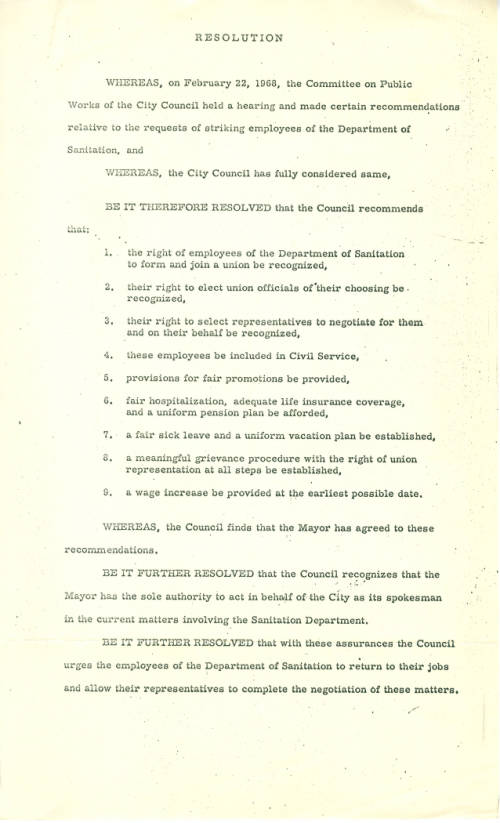
“City Council Resolution – February 23, 1968”. Civil Rights Collection, DIG Memphis.
Friday Feb 23, 1968
This afternoon, the Memphis city council rejected a recommendation from one of its committees that it grant formal recognition as well as an automatic payroll deduction of dues to the union representing the sanitation workers currently on strike. Further, the council passed a resolution stating that the mayor has full authority to negotiate on behalf of the city in the current dispute with the workers.
The rejection of the committee’s recommendation provoked outrage from the striking workers, many of whom believed just last night that they were on the verge of forcing the council to give in to their demands due to promises made by multiple council members. In protest of the council’s decision, many of the workers participated in an initially nonviolent march that police have since brutally suppressed.
The council meeting and protest march come on the heels of a fractious meeting of the council’s housing, building, and public works committee that degenerated into a sit-in by nearly 700 sanitation workers yesterday.
This morning started off with a closed session of the city council then an open session in the afternoon attended by nearly 950 striking workers.
Unknown to the strikers, it was during the closed session that the council decided to throw out the recommendation from the housing, building, and public works committee for an automatic payroll deduction of dues and formal union recognition.
The public session started with City Council Chairman Downing Pryor explaining to the audience that the city council has no authority to deal with the union and that the body’s resolution is merely a recommendation to and an expression of support for the mayor.
As Chairman Pryor read out the resolution, it became clear to many of the strikers and union supporters in the audience that this was not what many of the council members had promised them during the negotiations to end the sit-in at city hall.
Boos and jeers came up from the crowd as the Council Chairman went down the list recording voice votes from each of the members. The first few council members, all white, voted yes, and then the Chairman came to Councilman Davis, who is one of three black City Councilmen and who had been the target of the strikers’ ire yesterday.
Councilman Davis, who had unofficially worked out a deal for the strikers of a five cent raise this fiscal year followed by a ten cent raise the next fiscal year, tried to make an announcement about the pay hike. However, he only got as far as saying that workers would get raises of, “five cents immediately” before someone in the balcony yelled out, “[he’s] gonna sell us for a nickel!”
The strikers have demanded $2.35 an hour for laborers and $3.00 an hour for truck drivers. Current pay is $1.65-$1.85 an hour for laborers and $2.10 an hour for truck drivers.
Councilman Davis ended up voting no of the resolution, but it only got worse as the rest of the council voted. Men in the audience leapt to their feet to shout and shake their fists at the stage. In the end, the resolution passed overwhelmingly but only with votes from white council members. All three of the black city councilmen voted against it.
The men’s sense of betrayal this afternoon seemed acute. Less than 24 hours ago, many of these same city council members had made serious indications that they might grant the union formal recognition and a payroll deduction of dues.
As Memphis Labor Council President Tommy Powell put it to the striking workers, “We had promises from at least half of the Councilmen that they would vote for you and they lied. They told us last night ‘If you will get them to go home, we will vote for you!’ They lied.”
Amid the outrage from the crowd, the council began to move as a body toward a waiting police escort to take them out the back exit of the building. Meanwhile, union and civil rights leaders demanded to be heard. Some leapt onto the stage making a beeline for the microphones so they could address the men. However, they soon discovered that the council had arranged for the power to the microphones to be cut off as soon as the session ended.
With leaders unable to address the men, the situation earlier today devolved into chaos. Rev. James Lawson, one of the black ministers accompanying the strikers, yelled “Get us some microphones” hoping someone from the city would listen.
Councilman Jerred Blanchard said he felt “sick” at the entire situation and expressed regret at the council’s actions stating, “I take full blame for every bit of this because I had one, just one, of the votes that said ‘let’s do it this way.’” He later said, speaking about the council’s exit through the back of the building, “The only good thing I can say about my conduct is that I didn’t want to go.”
Among the strikers, there was “bitter, bitter anger” according to AFSCME president Jerry Wurf. Union representative Jesse Epps recalled, “I have never in all my life been so angry.” Local union president T.O. Jones started yelling, “We are ready to go to their damn jail” from the stage.
Concerned about the rising anger among the workers, some of the union leaders tried to think of a way for the men to let out their emotions peacefully. Jerry Wurf described the situation by stating that the men were not “bomb throwers. But they were really worked up. And when that kind of guy gets worked up, he’s worked up. And I was scared.”
Someone hit on the idea of a march to nearby Mason Temple, a local mostly black church, followed by a rally and the notion quickly spread among the leaders. T.O. Jones quietly obtained permission for a march from Police Inspector Sam Evans and then urged the men to file out of the auditorium.
Outside, an officer told the nearly 950 men that they would have to march along the sidewalk. The men protested. Jerry Wurf sensing how restless the men were pleaded with the police, “We just want to get them to a hall. Let us get them to a hall. They’ve been treated very badly this afternoon and they are just upset. Just help us keep it peaceful.” It was not long after that the unfortunate events on Main Street occurred. See follow up article for details.
City Council Resolution – February 23, 1968. Civil Rights Collection, DIG Memphis.
“Interview with Ezekiel Bell,”. YouTube, Uploaded by Crossroads Archive. Original tapes found in Memphis Search for Meaning Committee Records, University of Memphis Libraries Preservation and Special Collections Department.
“Interview with Fred Davis,” (Part 13). YouTube, Uploaded by Crossroads Archive. Original tapes found in Memphis Search for Meaning Committee Records, University of Memphis Libraries Preservation and Special Collections Department.
“Interview with Jerred Blanchard,” (Parts 8, 9). YouTube, Uploaded by Crossroads Archive. Original tapes found in Memphis Search for Meaning Committee Records, University of Memphis Libraries Preservation and Special Collections Department.
“Interview with Jesse Epps,” (Part 10). YouTube, Uploaded by Crossroads Archive. Original tapes found in Memphis Search for Meaning Committee Records, University of Memphis Libraries Preservation and Special Collections Department.
“Interview with Rev. James Lawson,”. YouTube, Uploaded by Crossroads Archive. Original tapes found in Memphis Search for Meaning Committee Records, University of Memphis Libraries Preservation and Special Collections Department.
“Interview with Robert James,”. YouTube, Uploaded by Crossroads Archive. Original tapes found in Memphis Search for Meaning Committee Records, University of Memphis Libraries Preservation and Special Collections Department.
Sweat, Joseph. “Angry Sanitation Workers Clash Briefly With Police While Marching Downtown, Council Is Firm: Loeb Has Sole Authority to Act In City’s Behalf, Members Agree.” Commercial Appeal (Memphis, TN), Feb. 24, 1968.
Sweat, Joseph. “Angry Sanitation Workers Clash Briefly With Police While Marching Downtown, 7 Are Arrested: Officers Act Quickly With Mace And Night Sticks To Restore Order.” Commercial Appeal (Memphis, TN), Feb. 24, 1968.
Beifuss, Joan Turner. At The River I Stand. 2nd ed. Memphis: St. Luke’s Press, 1990.






